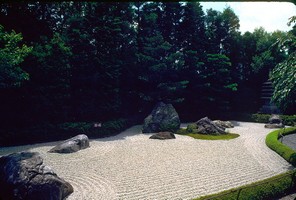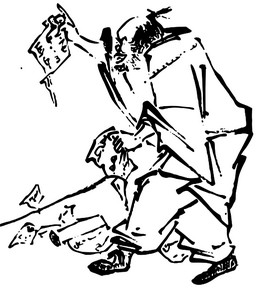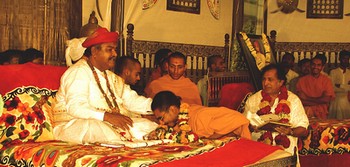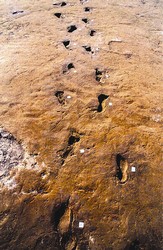TAT Forum
March 2002
![]()
Essays, poems, opinions and humor on seeking
and finding answers to your deepest life-questions
|
This month's contents: Zen & Common Sense (part 4) by Richard Rose | Poems by Shawn Nevins | The Use and Abuse of Teachers by Shawn Nevins | Silence by Bernadette Roberts | Volitional Contemplation by Bob Cergol | Passive Attention by Bob Fergeson | Tracks by Gary Harmon | Humor | Reader Commentary
|
Zen & Common Sense (part 4)
by Richard Rose
(~ Continued from the February 2002 TAT Forum)
... Words have positive intention, but often in a negative type of definition.
 In other words, we can take the word "apple." Most of us know that which an apple is—but try to define it to a person
who has never seen an apple, or to someone who just demands a definition from you to challenge your knowledge
on the matter.
In other words, we can take the word "apple." Most of us know that which an apple is—but try to define it to a person
who has never seen an apple, or to someone who just demands a definition from you to challenge your knowledge
on the matter.
So we say that an apple is a fruit. And the person wants us to define "fruit," and we get into an endless description of biological classifications to show mostly the types of fruit that an apple is not, down to the types of plants that are not fruit-bearing. Because we must define by distinguishing that apple. Not by describing its uniqueness, but by making it unique by describing everything else and then saying or implying that an apple is not all of these things.
The shortcut of course is to seize an apple and say, "This is an apple." Then if a person persists in childish sophistry by saying that it might be an illusion foisted upon the observer, then of course the proper thing to do, or the most propitious thing to do, would be to hit him with the apple. Definition has run its course. Subjective evaluation will produce no more meaning. The only thing left for the student is the apple experience.
So the student approaches the teacher and tries to get that teacher to define the Truth. The teacher knows that the truth must be an experience, not a bit of wisdom gained by argument, but he also knows that he must communicate with the student in the student's language. And hope by a special type of answer to illustrate and convince the student that language can be an everlasting tangent.
 So he says, "The truth is a white swan gliding upon blue waters."
So he says, "The truth is a white swan gliding upon blue waters."
And the student replies, "I do not understand. Does the swan always have to be white?"
And the teacher replies, "Make it any color that you wish."
Then the student comes back, "Then why did you say that the swan is white, if it can be any color?"
And the teacher again enigmatically replies, "My swan is white, but I cannot expect you to see it." And saying this he gets up and leaves, hoping that the student in the quiet that follows will understand that truth, like the swan, cannot be identified when it refers to the absolute nature of man; yet it is a fact that can be grasped somehow.
In the absolute sense the truth is a white swan, it is a lake, it is even an apple. It is also a black swan, or it is an ocean, or it is even a plum. You can make it any color you wish, for all objects, even though they are illusion or imaginings, may exist absolutely—but only as projections, illusions, or imaginings.
The thing to be aware of is the fact that the swan, the lake and the world may not exist at all as we see them. Even though, our short-lived body and limited senses must be able to touch the absolute and hence be related to it, because the teacher—in such a body and with such senses that are primarily and manifestly subject to error and individual coloration—while in that erroneous body, has found this truth.
And consequently he has survived, or transcends, the individual coloration that he goes through to find his absolute answer.
The swan is a swan, for all eternity. The swan at the same time may not exist at all except as a projection. The swan is as real as the mountains, and the mountains are as real as the planet, and the planet is as real as the visible constellations. But all of this may be a projection or an illusion.
But if man and the swan are projections, and they appear to our minds as real, then before we could ever demand of ourselves the acceptance of man and swan as not-being, it is evident that such a truth could only be observed with any degree of conviction by another mind. Since our mind believes that we are substance.
Zen would then be a system of looking at man with another mind.
If man is to look at himself objectively he has to first realize that he is not really scientific about himself, and he must take a first step and assume the position of scrutinizer, of impartial observer, and not listen to the self-definitions of the man under the microscope.
If we just take the idea that it is possible for man to be projecting a false picture of himself, and it is possible that man is defining himself according to that which he wants to believe himself to be, or according to ideas forced upon him by prenatal programming, then we have no other course as laboratory scientists except to set up a system that carefully takes note of such projection possibilities, and qualify all findings, statements, and conclusions with the reminder that such a projection might be there.
So we say that a swan is white—but it may be black. We say that black is black, but it might also be the absence of color. We say that a swan is on the lake, but the swan and the lake may very well not be there.
Now you might say at this point, "Is this really common sense, to keep qualifying everything that is witnessed?" I do not think it is so necessary to keep qualifying everything, once you know that we are relative creatures viewing a relative world. We go back immediately to things that seem more certain and avoid things that are manifestly erroneous.
In other words, we have to live with a world of swans and mountains until we can function with a mentality that demonstrates, if ever, that the swan exists only as a projection of ourself or some other mind-self.
The real common sense lesson behind this swan-episode is the realization once and for all time that man is not going to reach an understanding of reality by a type of reasoning that accepts things as his body vehicle sees them, or as his desires wish to see them.
He must be objective, even though that objectivity requires that he qualify every conclusion with the chances or percentages for error that lie in the human factors: the limitations of the senses; the ability to project things which even our neighbors project differently; the ability to accept concepts, theories, or ideas that are born in fears and desires of all men.
So I maintain that it's common sense to first admit that we do not have a perfect system, or science, or definition.
And it is common sense to note that a man could be more objective about the analysis of the cat or the mouse than he could be about his analysis of himself. (In other words we can very objectively dissect other creatures or analyze them, quite convinced that we're not taking the animal's psychology into consideration and allowing it to color our findings.) We must find some way to detach ourself from our specimen, if man wishes to be objective about the study of man, i.e., about himself.
It would appear that we will get nowhere by continually questioning everything that appears to mankind as being a fact or factual object. I don't deny that to do only that—to evaluate and hesitate forever to take any stand, or to accept any premise because of the finite or fickle nature of man's mind—would cause a stalemate that would put a stop to any future investigation or prospecting.
There is a way out of this. There is a way around this seeming dilemma of—"Shall we accept things, or shall we before we move deny everything, or question everything?" We keep in mind our fickle mind and try to plan around it.
 Most of the writings on Zen do not get into psychology much. If self-psychological systems were taught in old Zen
schools, it must have been done privately; perhaps the koans were goads to force each student to come to the same
conclusion, but each in his own way.
Most of the writings on Zen do not get into psychology much. If self-psychological systems were taught in old Zen
schools, it must have been done privately; perhaps the koans were goads to force each student to come to the same
conclusion, but each in his own way.
While much of thinking is not truly objective, each of us must keep on thinking, because the problem is not solved by just admitting that our heads are messed-up with body-oriented ideas or desire-born concepts.
Our first reaction is to rationalize that we cannot plan around our own mind. And this is not true. Religion for centuries has been at the task of planning around the instinctive or natural directions of man's mind. Our civilization and perhaps our technology may well not have been what they are today if man had not inhibited some of his more body-oriented appetites, or had not transmuted them into mental energies that led to technological advances.
*
I personally depart from the limitations of what is called traditional Zen—from the limitations that inadequate literature about Zen impels upon us.
Zen is a mental system. And the field of the mind is its battlefield. We hear that the battle to know the mind may well wipe out the battlefield. Meaning that in the process of analyzing the mind we may destroy the specimen.
Since Zen is a mental system essentially, it comes within the province of psychology. And it is either something that enhances psychology or detracts from psychological discoveries. And naturally, I assume that it not only enhances psychology, but it is the best system of understanding the mind that has ever existed.
It is vastly different from Western psychology. Western psychology attempts to build a system based upon the observation of the effects of stimuli upon the body. This is the reaction-science, or behavioral psychology. It relates to the body, not the mind of man. Our psychologists will answer this accusation by saying that there is nothing but a sort of somatic-mind: that's all there is, just what you see. Man is only that which you see, and if man has any attributes besides what you see, they can be traceable or witnessed through the body.
All of this is an attempt to be scientific, but the error lies in trying to analyze intangibles in a test tube. And arguing that it is not the chemist's fault that the mind or thought under observation can't be made visible, tangible, and capable of proving its own existence.
In other words, the chemist-psychologist just says, "Well, the thought doesn't exist, like you think it does; there's nothing outside of the body—those are just reactions, sometimes they're copied by electrical readings, on a electroencephalograph—but they're just electrical impulses that accompany certain reactions. And you can't prove otherwise." So he blames the thought itself for not being able to manifest itself more clearly, you might say.
The mind, like electricity, is, and like electricity cannot be weighed. But it can be measured by its effects. What it boils down to is monism as opposed to dualism. The current trend is to simply deny anything which cannot be scrutinized with the tools with which we are limited.
*
But we have diverged too much. I want to get back to the system of simplicity—of doing things simply and directly—that will lead us to full realization of the final state of reality or existence.
This system says that there's garbage and then there is stuff that smells worse than garbage. Discrimination is largely the ability to know the difference.
So that when a man comes to us and announces that he can multiply our money for us in a few seconds by hiding it under his house in a paper bag overnight while we chant mantras in the attic—we don't bother to trust that man with our money. We just don't think that common sense would advise that type of risk.
We avoid the obvious charlatan unless we are very stupid or retarded. We will avoid charlatans in proportion to our stupidity or good sense. People who put their life savings into a bag and hand it over to a stranger have spent their lives foolishly.
People who dedicate a life's energy to the first system they encounter (which is generally through their parents) may well be spending their life foolishly.
To be alert for false concepts, and to keep alert to the idea that we can be duped, even by ourselves, we set up yardsticks. These yardsticks help us to sort the garbage.
Man cannot approach the Truth. (That which I call "capital-T Truth". Small-t truth is just the evident, the everyday things that we accept, i.e., a lie that we recognize, or something in chemistry or science that we generally all agree upon to be true. Whereas capital-T Truth refers to the final state of things.)
Capital-T Truth relates to the final essence of man. The anterior observer of all that man is, and if possible, the qualities and conditions of that kind of essence and its relation to all other being.
Man cannot approach that which he does not yet know. It is like saying, "Let us go to the planet Theos," before knowing beforehand where it is, and before knowing that which is needed to make the trip. If the trip is going to take us two hundred years, we might find a way to build a faster ship; but there is no way at all to find the planet Theos if we do not know where it is.
The truth is a postulation only, until it is reached. There is an attempt to postulate theological truths, and then try to prove things which may have no bearing in fact at all, but were things which we just wanted to believe.
The sum total of all theological and transcendental findings is an unproven mass. And we must work with it, because we have no other data to work with, except with dogmas which evolved from concept structures....
~ Continued in the April 2002 TAT Forum
© 1974 Richard Rose. All Rights Reserved.
![]()
Poems by Shawn Nevins

|
I ask nothing with words. * Each piece of our self we save * My night is the night of forgetting. You are either frozen in memory, I am night calling, rising within you; * Incomprehensible contentment— |
![]()
The Use and Abuse of Teachers
by Shawn Nevins
 Let us say you find a living spiritual teacher. Someone you feel is authentic. Now what do you do? Do you sit at their
feet and try to absorb some etheric "presence" you hope is emanating from them? Do you ask every question that pops in
your head? Do you wait for them to give you a blessing or hand you the sacred robe and bowl? Do you sit at their feet
and take copious notes, listening attentively, hoping they will speak the secret formula to end all suffering? The best
teachers will point you in a direction and show you how to walk. Your job is to listen and to learn by doing.
Let us say you find a living spiritual teacher. Someone you feel is authentic. Now what do you do? Do you sit at their
feet and try to absorb some etheric "presence" you hope is emanating from them? Do you ask every question that pops in
your head? Do you wait for them to give you a blessing or hand you the sacred robe and bowl? Do you sit at their feet
and take copious notes, listening attentively, hoping they will speak the secret formula to end all suffering? The best
teachers will point you in a direction and show you how to walk. Your job is to listen and to learn by doing.
You can accumulate knowledge from a teacher. Not knowledge about your true being, but knowledge as to how to discover your true being. Those who believe they discovered knowledge about their being from the words of a teacher are merely memorizing information. You know nothing until you experience. Some teachers provide methods to help you find your own answers. This is knowledge given to you to use. Use it. Try it. Don't just theorize about it. Use their methods, but adapt them to your personality.
When the opportunity arises to ask questions, ask them. Don't be shy. Your shyness is fear. Be willing to ask what haunts you. Ask questions about your self and not the nature of the Absolute, God, and Heaven. The nature of such is best explained in silence. Ask about methods you have tried. Tell your successes and failures. Be willing to expose your ignorance. Secrets bind you to the mind. Open your mouth wide and let the teacher swallow your ignorance. From your ignorance will arise courage.
Don't be lazy. Read what the teacher writes. This saves time wasted in asking what is already answered. Come prepared and take notes. Come wanting answers. Your half-heartedness is a delusion. In your heart is determination.
 Don't waste your time learning the details of your teacher's life. No need to write a biography. It is good to know
that, like you, he was a person with weaknesses. That is reason enough for hope.
Don't waste your time learning the details of your teacher's life. No need to write a biography. It is good to know
that, like you, he was a person with weaknesses. That is reason enough for hope.
Some teachers use silence in their teaching. In that case, don't spend all your time asking questions. Be quiet in their presence and pay attention to their being. In silence, truth is unveiled. Don't project. The profundity, the depths, the great unknown you feel is in you. You and the teacher are one, but this must be felt and not intellectualized.
At times, you will grow angry and critical of your teacher. Study this. Your negativity is a projection of your frustration at your inability to act with 100% commitment. Your anger is your frustration with your limited life, your lack of progress, and your lack of earnestness. Your criticism is your habitual way of life attempting to preserve itself—your ego fearing change.
Always default to your gut feeling, your highest light, and your purest intuition. Don't let the teacher's advice overrule what you feel in your heart. You may discover you were wrong, but that is the only way you will develop the ability to find your path. That you must do, for the teacher cannot lead you all the way. The journey's end is within you.
![]()
Silence
by Bernadette Roberts
There is a silence within; a silence that descends from without; a silence that stills existence; and a silence that engulfs the entire universe. There is a silence of the self and its faculties of will, thought, memory, emotions. There is a silence in which there is nothing, a silence in which there is something; and finally, there is the silence of no-self and the silence of God.
Note: Bernadette Roberts became a Carmelite nun at an early age, and in her mid-twenties had the experience of becoming one with God, or the unitive experience as it is referred to in Catholic contemplative literature. As far as she knew this was the ultimate level of self-realization, and so she left the convent, eventually marrying and raising a family. Then, in her fifties, she experienced a more profound awakening, for which she had no preparation. She described this as the experience of no-self, also stating that when the self disappeared, God did as well. The earlier experience was most likely the realization referred to as cosmic consciousness in Dr. Richard Bucke's book by that name, or the equivalent realization described by Ramana Maharshi as kevala nirvikalpa samadhi, whereas the later one was probably that of sahaja nirvikalpa samadhi, the enlightenment of Buddha, equivalent to becoming one with the Absolute in Richard Rose's terms. The above excerpt was taken from http://www.cope.co.za/poetry/crossing/crossing06.htm.
![]()
Volitional Contemplation
by Bob Cergol
~ In response to a question about meditational technique
I would agree that what you describe as your basic technique [i.e., focusing on the source of consciousness] is sound. Yet I would also suggest that it is impossible to DO. The best to hope for is that an accident will occur as a result.
There seems to be some innate, automatic mechanism that prevents the looker from looking at himself. Everywhere he looks, he sees a vision—of himself, but never beyond that to the source. VOLITIONAL looking within turns into outward looking. (Yet what else can we do.)
 The reason, I think, is because the point of reference and the point of observation for everything "we" do is from that
of individual consciousness—born of the body/mind. There is an impersonal awareness which is the final observer and
which is the light that animates the body/mind and gives rise to our personal consciousness. This impersonal awareness
simply is, and when "attached" to the body/mind, that body/mind "inherits" or maybe even intuits this "is-ness." But the
combination with the physical machinery and its programming to survive results in this body/mind identity thinking that
IT is the self and IT fears extinction.
The reason, I think, is because the point of reference and the point of observation for everything "we" do is from that
of individual consciousness—born of the body/mind. There is an impersonal awareness which is the final observer and
which is the light that animates the body/mind and gives rise to our personal consciousness. This impersonal awareness
simply is, and when "attached" to the body/mind, that body/mind "inherits" or maybe even intuits this "is-ness." But the
combination with the physical machinery and its programming to survive results in this body/mind identity thinking that
IT is the self and IT fears extinction.
How then could such a mind look within, if SEEING would result in the admission of its own nonexistence, i.e. its own death. This makes me skeptical that contemplative techniques alone will succeed.
Somehow, when the personal consciousness recognizes and accepts its own mortality, the point of observation recedes backwards, or inwards, into itself. But I think this is an accident born of effort followed by hopelessness followed by acceptance. And except for the effort part, you cannot do any of it.
It seems to me the more ways you ask the "Who am I?" question, the better. When the question is a fresh one asked for the first time, there is the chance of sneaking past the ego-mechanism. I think "afflictions to the individuality sense" are key forms of this question and particularly effective if combined with the contemplative practice you describe. And I wonder if the contemplative part isn't supposed to be a non-volitional result of the former, troublesome effort.
![]()
The Listening Attention in Inquiry and Surrender
by Bob Fergeson
The following is not meant to imply there is 'nothing to be done' or to be a shortcut or trick to release. It is not for the lazy or clever, but written for those who have spent perhaps years of disciplined work on themselves and their commitment to finding the Truth.
To find that which lies beyond the mind, "the golden find," we must follow one of two paths. The first, and most familiar with the western mind, is the path of self-inquiry. The other is that of devotion or bhakti, the path of surrender. Both of these paths, if followed with earnestness, but not effort, can lead to realization. Let me explain.
The path of self-inquiry leads one to truth through discrimination and retreat. We see what we are not through unbiased observation, which leads us to un-attach ourselves from the false. It is not, and cannot be, a process of deciding what we will find and then going about creating or proving our theory. This is the state and practice of the ego, not of the truth.
Our mind has an almost infinite capacity to create, but little training in simple observation and questioning. To create is to do, to put forth effort. To simply observe, or to listen with the inner awareness, does not give the ego the central position it so craves. To observe or listen is a passive attention, a watching, which is earnest in its basis, but not a projecting or creating force. An active attention is one of putting forth effort to achieve an end, which must be decided on beforehand. Since we know nothing directly about realization beforehand, any effort at actively creating it would be just another ego-fantasy. But to listen with attention to what we observe will show us what we are not, leaving us eventually in the position of the silent witness, completely detached from any doing or effort. A relentless listening with attention, not a doing, will lead us into the knowledge of our true state as the unbiased observer. Any effort would be active or creative and therefore not a true inquiry or observation. To be everything, we cannot create the illusion of being any thing. Eventually, even the very act of inquiry will be lost.
To truly surrender to a higher power as a path to realization must also follow this same formula. The idea that surrender means choosing a new, more holy lifestyle is just as mistaken as self-inquiry with a pre-determined image as its goal. Changing one set of values for a new and improved set is not surrender, it is nothing but the ego once again calling the shots. To truly give up one's life is to watch the events of that life unfold before you, remaining as a silent witness, letting God perform the doing. To guide ourselves with effort along a preset path, no matter how holy, virtuous, or 'selfless,' would be a doing, not a surrender. Here also is needed the simple act of listening with attention. By removing our active attention from what is being done, we remove the sense of the doer, and instead effortlessly watch the mind as it spins its web, whether the web be that of a recluse or householder.
Surrender or inquiry lead to the same still place beyond the mind. Whether we question our very sense of self, or surrender it to a higher power, we are retreating from the individuality-sense, the doer: the creation of the mind. Our sense of what we are is forever changed, losing the sense of separation and angst born of identification with the finite. By watchful inquiry we see the truth; by selfless surrender, we accept it. By ceasing to project and create egos which we then call 'I,' we leave the game of duality and its never-ending compensation for the calm and quiet of no where and no thing... to die and through death, become aware.
![]()
Tracks
by Gary Harmon
 The tracks that I have left are not me; I am the one who leaves tracks. It is up to me to design my way of Being, in
such a way as to provide the best, for myself and for everyone. There is a connection that spills over from the
manifested into the unmanifested, tracks which bond our ancestors with our present and the future.
The tracks that I have left are not me; I am the one who leaves tracks. It is up to me to design my way of Being, in
such a way as to provide the best, for myself and for everyone. There is a connection that spills over from the
manifested into the unmanifested, tracks which bond our ancestors with our present and the future.
They say that a cup which contains water only holds the water as long as the container exists. When that cup is broken the water still exists but is no longer restricted by the cup. Much the same as tracks in the freshly fallen snow are no longer visible when the wind blows the free snow into the furrow that was originally made. But an astute tracker, such as a bloodhound, will be able to sense the old tracks. Our connection to the entire visible universe is as strong as the connection to the unmanifested itself, which lies beyond the shroud of the visible. It is obscured from direct vision, but it is there, none the less.
The phenomena of déjà vu (the feeling of having lived through the same moment before) is something that most everyone has experienced. These feelings fall into the idea of tracks crossing other tracks again and again. Many things that Richard Rose would talk about heightened my desire to become a more precise seeker of truth—on all levels, not just the visibly apparent. There is an intuitive sensitivity that is a means to this.
Deeper, the objects that appear as separate entities from ourselves are seen as all identical. The observer, which is observing everything simultaneously, will come to understand that we have all sprung from the same seed of consciousness. That is where the tracks of others are recognized as originating. All comes from the same spot. For years I lived as a separate thing, apart and alone from everything else. That is the way we are taught to believe, we are divided from everything else. Acceptance of this simple truth—that everything is interconnected—can lead to the acceptance of the true nature of all things. The tracks are only shadows of the real, perhaps a faded remembrance of having foraged that trail.
![]()
Humor...Earthy humor from Mae West: "To err is human—but it feels divine." And some practical advice: "Never eat more than you can lift." ~ Miss Piggy |
Reader Commentary:
Looking back in saved e-mails I found an article from the Forum which I e-mailed myself a month ago because it struck me at the time as something I needed to keep in mind—particularly the third and fourth paragraphs. It was 'Affliction to the Individuality Sense' by Bob Cergol. [See the March 2001 issue] ~ Jeff C., a Carnegie Mellon University student
I love this site. ~ Carla P., from Calgary, Alberta [Carla has posted a message on the Spiritual Friends Locator to find seekers who are interested in the kaballah and other aspects of mystical Judaism —Ed.]
|
Sign up for our e-mail alert that will let you know when new issues are published. Contact the Forum for questions, comments or submissions. Want to help? Your donation of $5 or more will support the continuation of the Forum and other services that the TAT Foundation provides. TAT is a 501(c)(3) not-for-profit educational organization and qualifies to receive tax-deductible contributions. Or, download this .pdf TAT Forum flyer and post it at coffee shops, bookstores, and other meeting places in your town, to let others know about the Forum. |

